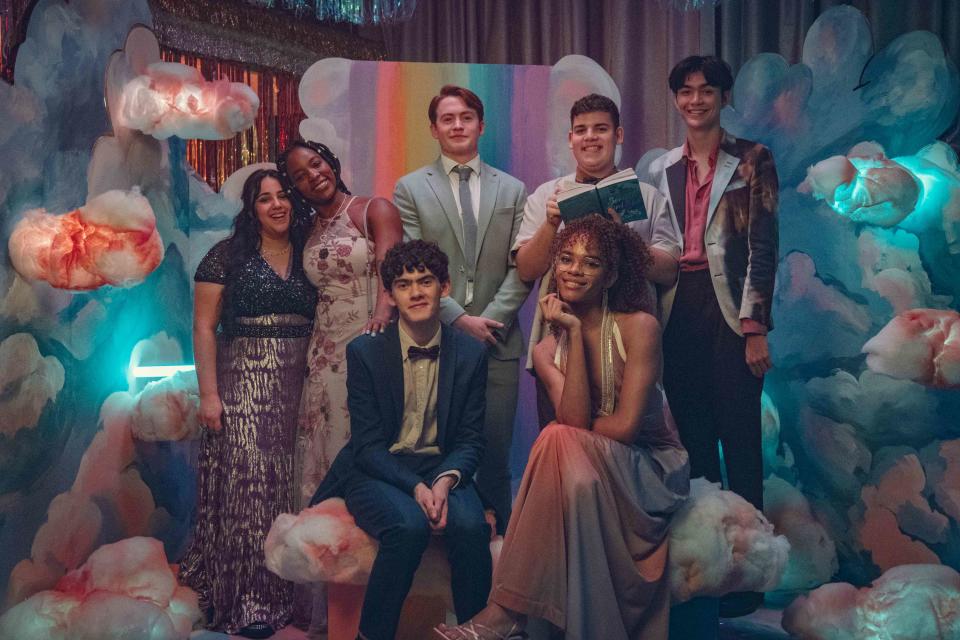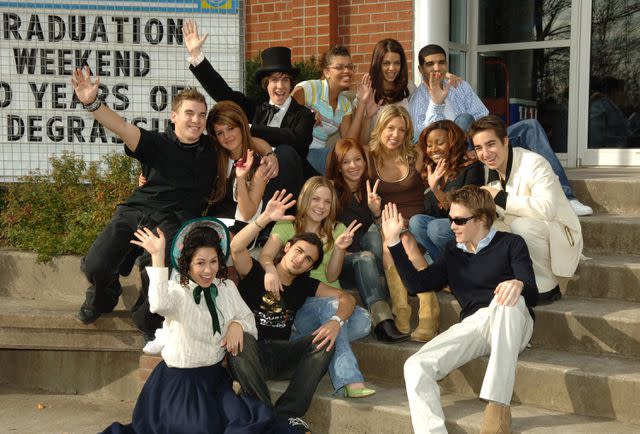8 TV Shows Teens Are Watching Right Now and What Parents Should Know
- Oops!Something went wrong.Please try again later.
- Oops!Something went wrong.Please try again later.
Including a few old faves.

Netflix / Samuel Dore
Medically reviewed by Laura Anderson Kirby, PhD
When I think of teen shows, I think of watching Beverly Hills, 90210 with my babysitters as a kid, but I also think of MTV’s Undressed. When I was a tween and teen, I spent many a late night secretly watching the sex comedy, hoping my parents wouldn’t wake up and walk down to the family room to see what I was doing. It was, admittedly, a really, really bad show, but it was one of the first times I saw young people experimenting with their sexuality and navigating relationships. Later, The O.C. took over as the must-see TV of my high school years, paving the way for compatriots like Gossip Girl and the rebooted 90210.
Teen culture has changed a lot since then, especially with the advent of social media; when I was a teen, we still had dial-up internet. (LOL.) However, streaming media is one of the most prevalent ways for young people to see themselves and their lives reflected onscreen, even if the drama is dialed up more than a few notches. Teen-centric TV has also caught on with plenty of adults; shows like Riverdale, Outer Banks, Never Have I Ever, and The Summer I Turned Pretty are all massive hits with people in their twenties and thirties too.
But what should parents keep in mind as their kids spend the weekend scrolling and streaming? “Shows give a perception of different lives and lifestyles kids might not have been exposed to previously, and they may get curious,” says Reena B. Patel, a parenting expert, positive psychologist, and licensed educational board-certified behavior analyst. “Teens are still learning and developing so they may be easily influenced. It's important for parents to teach teens the full picture on your timeline, ideally, instead of them forming their own perceptions by what they see before talking to you about it.” Patel adds that consistent exposure to themes of sex, drugs, and alcohol can normalize these behaviors for teens well before they’re mature enough to deal with them on their own.
Related: Parents' Most Loved (and Most Hated) TV Shows for Children
If you feel like you have absolutely no idea what your kids are watching, you’re not alone. “It can be hard to track, especially since streaming is accessible on a variety of devices that can be used as a family—or in private,” says Kara Grimes, EdS. “Keep an eye out for changes in your child’s behavior patterns, conversation topics, and daily routine if you suspect they are engaging in media that may warrant deeper conversation with a trusted adult.”
Feeling overwhelmed with all the options and not sure where to start setting guidelines for age-appropriate viewing? “Follow rating guidelines and make decisions based on the maturity of your child,” says Patel. “Make family decisions for what you want your kids exposed to and when, and do what's best for your kids and your parenting style.”
Below, learn more about some of the most popular teen shows of 2023 and what parents should know about each one.

Getty Images
The Summer I Turned Pretty (TV-14)
Amazon Prime’s adaptation of Jenny Han’s trilogy follows teenager Belly, who spends the summer with her mom’s best friend's family. There, she finds herself at the center of a love triangle between two brothers, Conrad and Jeremiah. It’s a pretty timeless coming-of-age story with heavy romance themes.
“It brings back to life the ‘Will they, won’t they?’ and other teen romance tropes parents might be familiar with,” explains Grimes. “This is a great show to discuss self-image, changing relationships, and expectations with your teens.” She notes that The Summer I Turned Pretty does include brief nudity, implied sexual contact, some substance use, and topics of anxiety and grief.

Jackson Lee Davis/Netflix
Outer Banks (TV-MA)
Netflix’s Outer Banks is a super-popular series about the Pogues, a group of friends who are searching for a hidden treasure that belonged to group leader John B’s dad. The North Carolina setting is gorgeous, and Outer Banks deals with themes like friendship, love, family ties, and social status, especially the “haves” and “have nots” of the Pogues and the rich-kid Kooks. Patel notes that Outer Banks contains scenes of “running away and not listening to parents, violence, language, sexual content, drugs, and guns.”

Freeform/Justine Yeung
Cruel Summer (TV-14)
Freeform’s mystery series Cruel Summer centers on the nature of female friendships, exploring how intense and dramatic they can be during the teenage years. Season one is set in the early ‘90s and deals with the disappearance of a young girl, while season two is about a love triangle that ends in murder.
“This show contains content related to harsh abuse, sex, mental illness, drinking, and profanity,” says therapist Robin Glenn. To avoid your child becoming desensitized to such topics, Glenn recommends having a chat with them as they watch—and in general. “Parents need to talk about coping strategies, respectful behavior, boundaries in relationships, and mental health. Without these conversations, kids may learn their coping strategies from dramatization, which is good for ratings, but not good for personal health.”
Related: Kids TV Shows That Actually Teach Valuable Life Lessons, According to an Expert

Netflix / Samuel Dore
Heartstopper (TV-14)
Heartstopper, based on a graphic novel of the same name, is a Netflix series about two close friends who fall in love. It also follows their friends and classmates who are experiencing crushes, questioning their sexuality, and moving into young adulthood.
Glenn notes themes of “bullying, sexuality, and profanity” on Heartstopper, but the show can also be a great conversation-starter about identity. “Helping kids to understand how they can and should always show up as themselves can be a valuable tool to help them navigate matters of kindness, friendship, and decision-making,” she adds.

Eddy Chen/HBO
Euphoria (TV-MA)
HBO’s gritty, award-winning drama is centered on a group of teenagers dealing with drug addiction, sexuality, body image, and so much more, but this is not your traditional CW drama. Rue, played by Zendaya, is addicted to drugs and spends most of the series reckoning with her addiction and her enduring grief over the death of her father, while other characters include drug dealers and troubled, manipulative jocks, along with young women navigating sex and self-worth.
While Euphoria absolutely requires a content warning, Grimes believes the show can also open up a channel of communication between parents and their teens. “Rue’s experience with grief and her mental health (anxiety, bipolar disorder, depression, OCD, and substance use disorder) can start a thought-provoking conversation surrounding support and family systems,” she explains. That said, Euphoria isn’t a show for tweens or younger teens. “Its heavy and graphic portrayals of sexual conduct, nudity, substance use, profanity, and violence makes this show inappropriate for younger audiences, despite the majority of the cast portraying high-school teens.”

ISABELLA B. VOSMIKOVA/NETFLIX
Never Have I Ever (TV-14)
Netflix’s Never Have I Ever is a coming-of-age comedy-drama series about Devi, a high school student who decides this is the year she gets more popular. Throughout the series, Devi and her friends deal with crushes, relationships, sexuality, grief and family dynamics. Patel flags that parents should take note of “sexual content, underage drinking, truancy, and social media” throughout the series.

Netflix
Sex Education (TV-MA)
Netflix’s Sex Education is technically rated MA, but given that it’s about a group of high school students figuring out sex and sexuality, and a popular favorite of many young people, parents should be aware of what’s going on at Moordale school. “As the name suggests, sex and sexuality are heavy themes in this show and it boldly explores topics few shows venture to,” says Grimes. “This program features heavy and graphic sexual conduct and nudity, making it an inappropriate selection for children.”

Colin Bentley/The CW
Riverdale (TV-14)
The CW’s notoriously kooky teen soap may have ended its run this year, but its impact will live on forever thanks to the truly bonkers plotlines, including Archie getting mauled by a bear, time travel, Jughead becoming a Rat King and so, so much more. You name it, it probably happened on Riverdale.
"Riverdale is a show that takes camp to the max with its off-the-wall plotlines and characters,” explains Grimes. It’s campy, but Riverdale could simply be too much, too fast for some viewers. “This show depicts moderate to extreme sexual conduct, violence, death, and frightening scenes that can be unsettling for younger audiences.” If your child is considering watching the series from the start, know that Riverdale can and will go there.

George Pimentel/WireImage
Degrassi (TV-PG)
It’s a classic, and maybe you watched it too! Degrassi, a Canadian teen soap that began in the ‘70s and has been updated from decade to decade, still retains its popularity and relevance, and it’s a good pick for teens who are starting to confront the ups and downs of this period of their lives. “Much like the shows listed above, mature themes are explored, but with a younger audience and cast in mind,” explains Grimes. “It depicts several heavy themes such as mental health, suicide, school violence, sexuality, substance use, teen pregnancy, and others in a manner that is realistic and provides relevant information to help teen’s self-concept and view of the world.”
Related: Classic Movies and TV Shows Families Can Watch Together
For more Parents news, make sure to sign up for our newsletter!
Read the original article on Parents.

